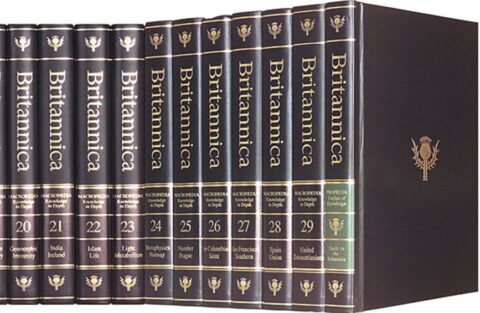In the latest SHuSH newsletter, Ken Whyte recounts the decline and fall of the greatest of the print encyclopedias:
I remembered all this while reading Simon Garfield’s wonderful new book, All the Knowledge in the World: The Extraordinary History of the Encyclopedia. It’s an entertaining history of efforts to capture all that we know between covers, starting two thousand years ago with Pliny the Elder.
The star of Garfield’s show, naturally, is Encyclopedia Britannica, which dominated the field through the nineteenth and twentieth centuries. By the time of its fifteenth edition in 1989, the continuously revised Britannica was comprehensive, reliable, scholarly, and readable, with 43 million words and 25,000 illustrations on a half million topics published over 32,640 pages in thirty-two beautifully designed Morocco-leather-bound volumes. It was the greatest encyclopedia ever published and probably the greatest reference tool to that time. It was sold door-to-door in the US by a sales force of 5,000.
Just as the glorious fifteenth edition was going to press, Bill Gates tried to buy Encyclopedia Britannica. Not a set — the whole company. He didn’t want to go into the reference book business. He believed that the availability of a CD-ROM encyclopedia would encourage people to adopt Microsoft’s Windows operating system. The Britannica people told Gates to get stuffed. They were revolted by the thought of their masterpiece reduced to an inexpensive plastic bolt-on to a larger piece of software for gimmicky home computers.
Like the executives at Blockbuster, the executives at Britannica eventually recognized the threat of digital technology but couldn’t see their way to abandoning their old business model and their old production standards and the reliable profits that came with large sets of big books. CD-ROMs seemed to them like a child’s toy.
Even as more of life moved online and the company’s prospects for growth dwindled, the Britannica executives could still not get their heads around abandoning the past and favoring a digital marketplace. They figured that their time-honored strategy of guilting parents into buying a shelf of books in service of their kids’ education would survive the digital challenge, not recognizing that parents would soon be assuaging their guilt by buying personal computers for their kids.
By the time Britannica brought out an overly expensive and not-very-good CD-ROM version of its encyclopedia in 1994, Gates had launched Encarta based on the much inferior Funk & Wagnalls. It might not have been the equal of the printed Britannica, but with its ease of use and storage, its much lower price point, and its many photos and videos of the Apollo moon landing and spuming whales, Encarta made a splash. It was selling a million copies a year in its third year of production — a number that no previous encyclopedia had come close to matching.
As it turned out, Britannica‘s last profitable year was 1990 when it sold 117,000 bound sets for $650 million and a profit of $40 million. With the launch of Encarta, its annual sales were reduced to 50,000 sets and it was laying off masses of employees.
Encarta‘s own life was relatively short. It closed in 2009, at which point it was selling for a mere $22.95. The world now belonged to Wikipedia.




